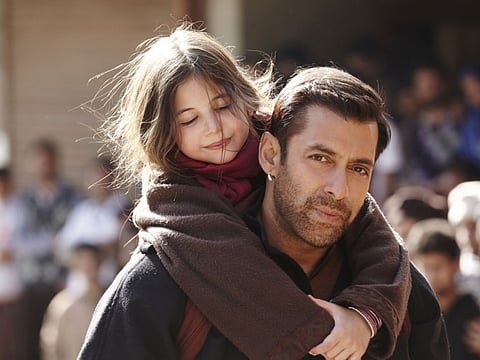7 films for Indians and Pakistanis to watch
It’s not all propaganda and war. As the two cinema-loving countries celebrate Independence Day, here are movies that have extended the hand of friendship from either side

Cinema has long been the bridge that unites minds, even as a culture of jingoism unspools around us.
Perhaps emotions are a universal thread that links all of humanity, or perhaps, people find a sense of joy in escapism.
For the two countries that wake up this week to 70 years of Independence, cinema remains the common denominator that ties two culturally similar nations into an unshakeable bond.
As Pakistan and India wake up to the dawn of a new decade of independence, Gulf News tabloid! marks the historical moment with seven films that extend the hand of friendship by putting aside difference to celebrate human emotions.
Bajrangi Bhaijaan (2015)
An uplifting tale about a young Pakistani girl, with a speech impediment, who gets left behind in India. As young Munni finds herself alone in a strange land, a do-gooder, played by Salman Khan, gives her shelter and devises a plan to return her home to her family in Pakistan. Along the way, the unlikely pair befriend a down-on-his-luck reporter, played by Nawazuddin Siddiqui, who helps them complete their mission.
Why it works: Moving away from the jingoism that is often repeated in Bollywood, this Kabir Khan-directed film went beyond the politics and depicted a sensitive humane story that touched the hearts of its viewers on both sides of the border.
Veer Zaara (2004)
While at the heart of it Veer Zaara was a love story, with a message that those who are meant to be will always find a way, what set this one apart from your standard happily ever afters was a cross-border romance that rose above religion and politics. Shah Rukh Khan’s Veer is an Indian Air Force pilot who rescues a young Pakistani girl, Zaara (Priety Zinta), and they fall in love along the way. However, political power play casts a shadow over their relationship and Veer finds himself falsely accused and imprisoned for decades before a young Pakistani lawyer (played by Rani Mukherjee) uncovers the truth.
Why it works: While at one end, we have films that pass down xenophobic biases to its unsuspecting audience, Veer Zaara conveyed a simple message that love knows no boundaries. A pragmatic approach it wasn’t, but sometimes rose-tinted glasses can achieve what practical solutions cannot.
Filmistaan (2012)
A delightful story of mistaken identity that results in a down-on-his-luck actor falling in the hands of a terrorist group. The mercenaries decide to hold on to their hostage until the real target is located. However, ideologies change when they discover both sides share a common love for cinema.
Why it works: Well, aside from the crisp writing and cracking humour, the story is much more than a parody of Stockholm syndrome. The underlying message hits home when it is clear that a common cultural bond unites both sides.
Happy Bhag Jayegi (2016)
An Indian bride-to-be attempts to elope with her lover but somehow, lands in a truck bound for Lahore, Pakistan. Confusion ensues as the bride refuses to return to her homeland, fearing her father will force her into marrying someone she does not love.
Why it works: While it was a refreshing film with some genuine laugh-out-loud moments, the film also connected with Gen Y and millennials — a group that didn’t recall the horrors of the partition, but celebrated the cultural bond that ties both sides together.
Refugee (2000)
Star kids Abhishek Bachchan and Kareena Kapoor Khan burst into Bollywood with this heavy-on-the-emotional-quotient drama. Bachchan plays an agent who helps smuggle denizens of former East Pakistan to enter West Pakistan. One of the families he’s helping ferry has a daughter called Nazneen (Kapoor Khan) who steals the young man’s heart. Will their love survive the perils or borders and hate, forms the crux of the story.
Why it works: Okay, we admit this wasn’t JP Dutta’s finest work. We also admit, the director has fuelled jingoism in the past with his cinematic wonders. However, sincere performances by the lead pair and a message of moving past the sins of our forefathers helps elevate Refugee into a film of substance.
Ramchand Pakistani (2008)
A poignant Pakistani film, which also made its way over to the emirate with Dubai International Film Festival, sees Champa (Nandita Das), a young Hindu woman who is left desolate when her husband and young son disappear from her village, stationed at the border of Pakistan and India. Unknowingly, young Ramchand ends up crossing the border into India and his father Shankar follows suit. Mistaken for terrorists, the duo is arrested and imprisoned for years. Meanwhile, Champa faces trials and tribulations of her own being a Hindu in Pakistan who must fight her own demons thinking she’s been abandoned.
Why it works: Despite being a Pakistani film, several Indian cast and crew members worked on this collaborative effort that narrated the human tragedies of war and skirmishes, which affect real people.
Heena (1991)
Another collaborative effort between India and Pakistan saw Rishi Kapoor play Chander, a Kashmir resident who meets with an accident on the day of his engagement and ends up in Pakistan with amnesia. Pakistani actress Zeba Bakhtiar plays a villager, living on the banks of the Jhelum river. She comes upon an unconscious Chander and rescues him. Over time a love story ensues, but the truth finally rear its head and the villagers unite to provide a safe passage to the young Indian amid them.
Why it works: While it was an over dramatised effort, one that reeks Bollywood, the film’s climax has a heart-broken Chander ask the question, why do we wage war? Why indeed.
Sign up for the Daily Briefing
Get the latest news and updates straight to your inbox



